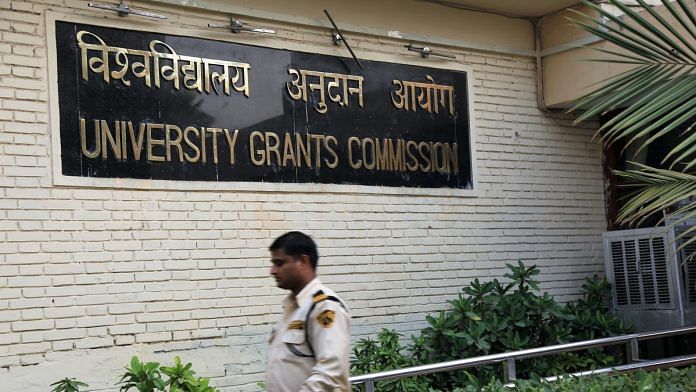New Delhi: Students enrolling for PhD in India will now have to compulsorily study the ethics and misconduct of publication.
The University Grants Commission (UGC) Thursday sent a circular to all higher education institutions affiliated to it, saying it has approved a two-credit course on ethics and misconduct of publication. Titled Research and Publication Ethics (RPE), the 30-hour course needs to be made mandatory for all PhD students for pre-registration course work in the universities.
The idea is to improve the quality of research papers by teaching students how to go about it at the beginning of their PhD — from teaching them the ways to research a topic, the best practices to adopt and how to avoid plagiarism.
“The quality of research papers produced in India is not good, and we are aware about that. There are complaints of plagiarism as well, which is why we now want to teach students ethics of publication so that such complaints can be avoided,” said UGC secretary Rajnish Jain.
Also read: Modi govt asks IITs, IIMs, varsities to track student social media posts amid CAA protests
The problem
This is one of the many ways in which the government wants to improve the quality of PhDs in India. In July, a UGC committee had suggested a number of ways in which research quality can be improved. It also came up with a list of recognised journals, called the CARE list, and suggested that only those research papers that are in the CARE list of journals should be used for academic purposes.
The report also said that Indians have contributed 35 per cent of all articles published in fake journals.
The report added that data manipulation and plagiarism are issues of great concern.
The syllabus
The syllabus will include philosophy and ethics, and scientific conduct, which will teach students about intellectual honesty, falsification, fabrication and plagiarism.
A module on open access publishing will teach them ways to utilise open resources like data and how to interpret it in the correct way.
To teach about misconduct, students will be given examples of fraud complaints from India and abroad, and made aware about copyright issues. Use of plagiarism tools like Turnitin will also be taught.
Students’ response
Deeksha Bhatheja, who has enrolled for a PhD at Panjab University in Chandigarh, called it “a good move”.
“As part of UGC regulations, all students are required to do pre-PhD course work. If we are taught ethics of publication as part of the course, it’s a good move. Most students don’t know what source to use for their research and how to avoid plagiarism and keep other checks and balances. A basic knowledge of all this is necessary.”
Mamta Tripathy, who is in the final year of her PhD at Delhi University, concurred.
“When I started pursuing my PhD, I had to go to the guide for everything, even the basics like sourcing and indexing. But if students are taught the basics in advance, the research process will be smooth,” she said.
Bikramaditya Kumar Choudhary, who teaches at the Jawaharlal Nehru University’s School of Social Sciences and has PhD scholars working under him, also viewed this as a positive step.
“Plagiarism and unethical practices in India are so rampant that even top academicians are not untouched by them. In such a scenario, if UGC is bringing a policy-level change to teach students about ethics, it’s a welcome step,” Choudhary said.
Also read: How a proposed Rs 3,000-cr fund cut could affect school education, teachers’ salaries




Along with scientific misconduct I think UGC should also make guidelines for the research guides who hijack the work of PhD students and publish it under them as first author. PhD students’ hardwork goes in vain when the credit for the work done by him or her is taken by the research guide.
Short Communication or a short research paper is well appreciated by the fellow researchers and also has more chances of its publication in the international journals than the one long paper of 10 to 15 pages , stuffed with copied material or plagiarism stuff in it to show its heaviness.
Supervisor or examiner can judge its new findings in a second . Besides as journals publication has become costly difficult , to accommodate lengthy papers and so there r chances of getting rejection slip . Brevity is the beauty .
The introduction of RPE course by UGC is a welcome step to improve the quality of research papers , instead of their quantity . Good teaching for the young scholars.
It is better to submit original findings of scholars, in the form of Short communications or a short paper of 4 to 5 pages to emphasise the new findings of study . That will go a long way In advancing the knowledge.
Sir,
In this King Lear’s world, the basic requirement and promotion in all aspects of social practices is encouragement to truth and honesty. University and research are small sample of social practices. If you want science with ethics you need a society practicing ethics, promotes honesty, does not discourage failures and one discourages lies and deceit.